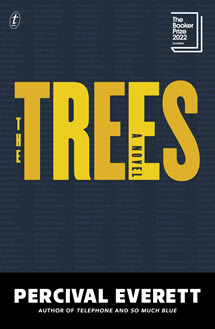Reviewed by Robert Goodman.
By Percival Everett, Text, $32.99.
 Percival Everett’s 2022 Booker-shortlisted new novel The Trees is a strange genre mash but one with a serious and disturbing point to make. Part broad satire, part police procedural, part horror story and all social commentary, Everett take on a pernicious history of violence in the United States.
Percival Everett’s 2022 Booker-shortlisted new novel The Trees is a strange genre mash but one with a serious and disturbing point to make. Part broad satire, part police procedural, part horror story and all social commentary, Everett take on a pernicious history of violence in the United States.
The book opens in the ironically named town of Money, Mississippi, the name itself “a marker of self-conscious ignorance that might as well be embraced, because, let’s face it, it isn’t going away.” This tone continues even after the first gruesome murder of a local redneck, followed by the murder of a second. Agents from the Mississippi Bureau of Investigation are dispatched to Money when it turns out that the same clearly dead Black man was found at both crime scenes. That man has a passing resemblance to Emmet Till, a fourteen year old lynched in Mississippi in the 1950s and it turns out there is a family connection between the two dead men and the Till case. Soon the FBI is involved and not long after there are more murders, not only in Money but other places in the country, at which point the plot starts takes a fairly metaphysical turn (without ever losing its satirical edge).
The central concern of The Trees is the history of lynching in America. One character, known as Mama Z, has kept a record of all of these events and the names of all of the people who have died as a result:
Damon Thruff read dossier after dossier, name after name… What was most unsettling was that they all read so much alike, not something that one wouldn’t expect, but the reality was nonetheless stunning… He found it all depressing, not that lynching could be anything but. However, the crime, the practice, the religion of it, was becoming more pernicious as he realized that the similarity of their deaths had caused these men and women to be at once erased and coalesced like one piece, like one body. They were all number and no number at all, many and one, a symptom, a sign.
And while the narrative is often wild, irreverent and comical, Everett pauses to remember these people and the places where they suffered.
The Trees is for the most part told in a broadly comic and satiric mode – with characters like FBI agent Herberta Hind (nicknamed Herbie by her parents) and redneck locals like Charlene Bryant who likes to be called by her CB callsign “Hot Mama Yeller” even by her children. But Everett never loses sight of his target – the people and the attitudes that underlie the epidemic of lynching through American history and an unquenched (and possibly unquenchable) thirst for recognition and justice. So that while it is often laugh out loud funny, The Trees is also deeply contemplative and powerful.
Over 850 more book reviews can be found on Pile by the Bed.






